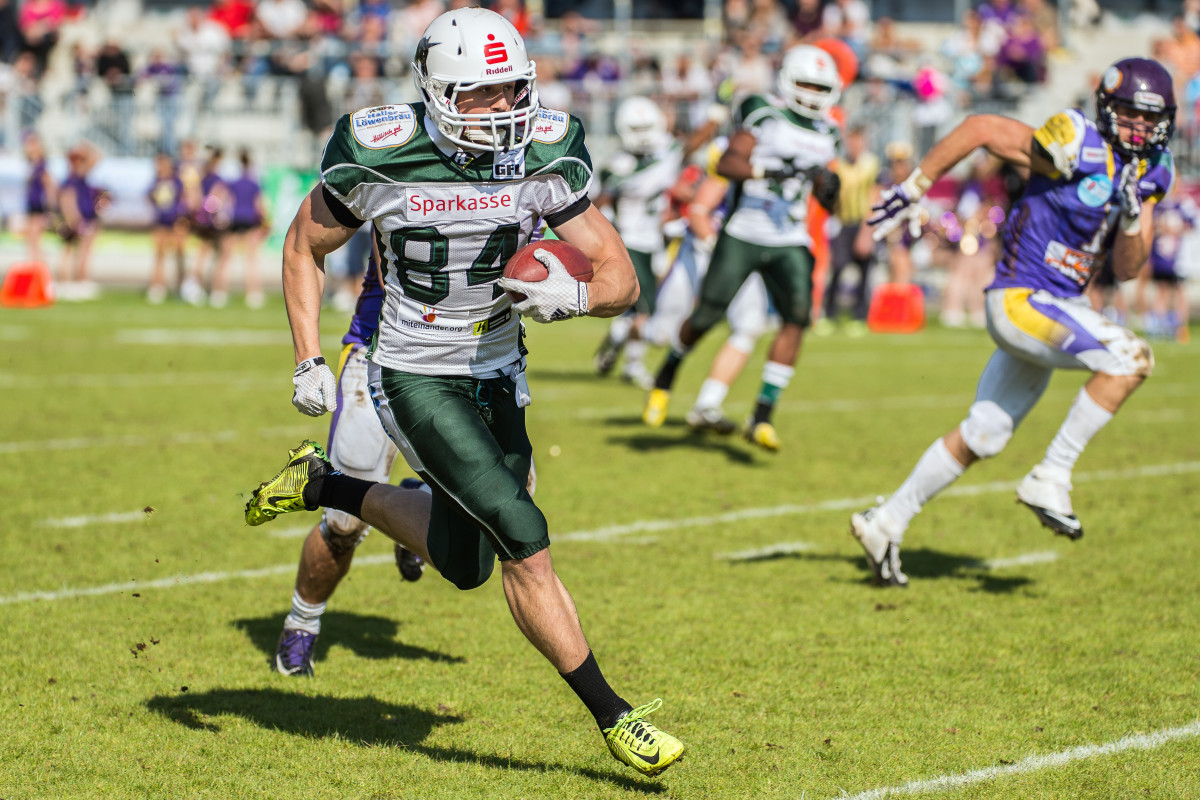Wide Receiver Moritz Böhringer of Germany Talks Food, Cars, and Making an NFL Roster

Moritz Böhringer may have been an unknown in the United States when he was selected in the 2016 NFL draft, but he hadn’t been an anonymous athlete in his home country of Germany. In his final season playing for the Schwäbisch Hall Unicorns of the German Football League, his stat line read 59 receptions for 1,232 yards and 13 touchdowns, with two kick-return touchdowns.
And when the Minnesota Vikings drafted him 180th overall in the 2016 draft, his profile skyrocketed on an international level. He is not only the first player to be drafted directly from the GFL, but is also one of only four active NFL players of German descent. I interviewed Böhringer, who spent last year on the Vikings’ practice squad, about his experiences in the U.S. and Germany, including his take on football, cars, and, of course, food!
What is the difference in the level of competition between the NFL and the GFL?
In Germany, the teams need players, so the competition isn’t very hard because there aren’t that many players who play the sport—not as many good players—so there is a lower level of competition. In the GFL, you have to compete a little bit [for a roster spot], but in the lower leagues they take whatever they can get.
Since your favorite team was the Minnesota Vikings, what were your emotions when they drafted you?
First of all, I was happy to be drafted. It didn’t really matter which team [drafted me], but since it was the Vikings, it was really special. It was also great because my mom and my sister were there as well.
You got into football by watching Adrian Peterson highlights. How did it feel to meet him in person and play with him?
It was a bit strange in the beginning since all I knew was basically from watching videos on the Vikings’ website. Now I am in the videos, so it was pretty weird.
Since you started off by watching those Peterson highlights, did you initially want to be a running back as well?
When I watched the Adrian Peterson highlights, I had no idea what the positions were; I was just impressed about the way he played, and it didn’t really matter what position I wanted to play.
Have you made any trips back to Germany to visit your former team?
Last June was the last time I was back; I was there for two weeks. The most important thing was to visit my family, and I watched a football game with them against Munich, [the Cowboys of the GFL].
Are you still in contact with some of your former Unicorns teammates?
Sometimes I write them, especially if they have important games, to wish them good luck. They sometimes ask me how it’s going, what I’m doing right now, stuff like that. I mostly look up the highlights of the games on Facebook, and I have them all as friends, so [the highlights are] easy to watch.
How do you think football in Germany prepared you for the NFL?
Just to get a basic understanding of how to play football, how to play receiver, but it’s hard to compare; the whole structure [in Germany] is just not as professional.

I cooked käse spätzle for my girlfriend, but it was hard because I could not find the right cheese. Aldi, [a German grocery store], has the noodles and a lot of good German stuff as well. She liked it, but she likes mac and cheese better.
What have you found to be the biggest difference between German and American culture?
Definitely the cars here. In Germany I didn’t really use my car a lot; I just went to school on a bike. But here you have no chance to use a bike; you need a car.
How long did it take you to get used to the USA, or are you still adjusting?
I would say the biggest challenge wasn’t really adjusting to the USA, it was just because I lived at home before, and I had to find an apartment, pay my bills, and all that kind of stuff. The first month was kind of strange to just do everything on my own; I had to manage the whole house and wash my clothes.
Have any of your teammates on the Vikings learned how to speak German?
Some learned some words, like how to count to three, or [how to say] “good job,” but I don’t think anyone can speak German totally. Once they start talking [in English] I understand, so it’s O.K. They want to know what kind of places they should visit on their trips to Europe, [so they ask me], but that’s about it.
Have you been watching the GFL this season?
I know the Unicorns have won every game so far this season, but I don’t follow any other teams, so that’s all I know.
What’s the best food that you’ve eaten that you can only find in America?
I definitely think that the American steaks are better than the ones in Germany! And a bit cheaper too.
What was the first big purchase you made when you signed your contract?
I think the only big purchase was a car, a Chevy Silverado, because I needed it. I would never buy it in Germany.
What do you miss most about living in Germany?
I would say my family and my German friends, but everything else you can get here, except for döner!
This interview has been edited for length and clarity.
Photographs by (from top) AP; Manfred Löffler/Picture-Alliance/DPA/AP
